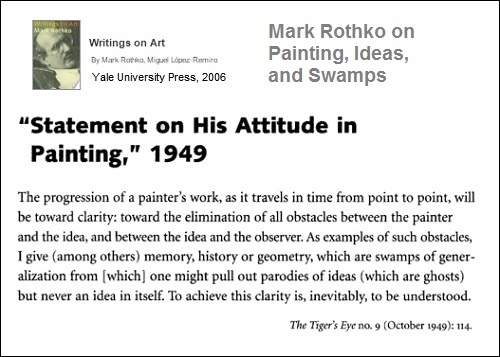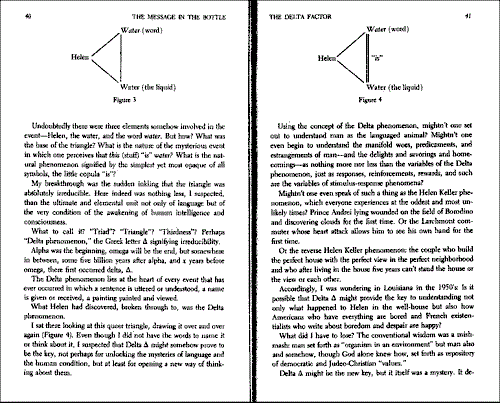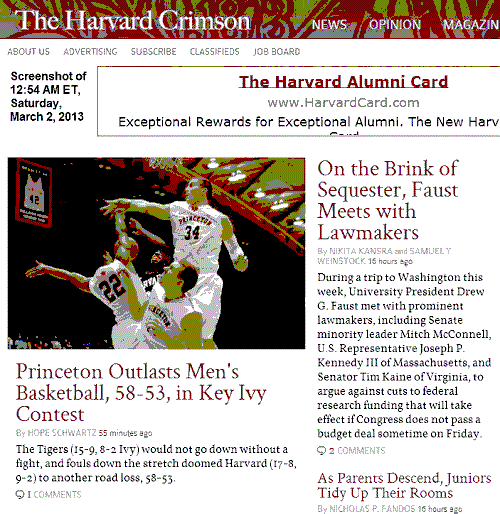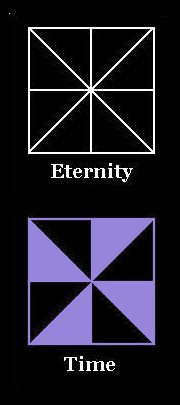
Tuesday, October 22, 2024
Wednesday, September 4, 2019
Wednesday, August 28, 2019
Tiger’s Leap to 1905
Tuesday, August 27, 2019
Tiger Leaps
Wednesday, June 5, 2019
Wednesday, April 13, 2011
Wednesday, October 23, 2024
The Delta Transform
Rothko — "… the elimination of all obstacles between the painter and
the idea, and between the idea and the observer."
Walker Percy has similarly discussed elimination of obstacles between
the speaker and the word, and between the word and the hearer.
Click images to enlarge.
Related mathematics —

The source: http://finitegeometry.org/sc/gen/typednotes.html.
A document from the above image —
|
AN INVARIANCE OF SYMMETRY BY STEVEN H. CULLINANE
We present a simple, surprising, and beautiful combinatorial
DEFINITION. A delta transform of a square array over a 4-set is
THEOREM. Every delta transform of the Klein group table has
PROOF (Sketch). The Klein group is the additive group of GF (4);
All delta transforms of the 45 matrices in the algebra generated by
THEOREM. If 1 m ≤ n2+2, there is an algebra of 4m
An induction proof constructs sets of basis matrices that yield REFERENCE S. H. Cullinane, Diamond theory (preprint). |
Update of 1:12 AM ET on Friday, Oct. 25, 2024 —
The above "invariance of symmetry" document was written in 1978
for submission to the "Research Announcements" section of the
Bulletin of the American Mathematical Society . This pro forma
submission was, of course, rejected. Though written before
I learned of similar underlying structures in the 1974 work of
R. T. Curtis on his "Miracle Octad Generator," it is not without
relevance to his work.
Wednesday, October 9, 2024
The Blackboard Jungle Book …
|
Ratan Naval Tata was born on Dec. 28, 1937, in Bombay, now Mumbai, during the British Raj. His family belonged to the Parsi religion, a small Zoroastrian community that originated in Persia, fled persecution by the Muslim majority there centuries ago and found refuge in India. Mr. Tata became a leader of that community. — New York Times obituary on 9 October 2024 |

See also theta functions in this journal.
For those who prefer narratives to mathematics . . .
Tiger at the Fire Temple


Thursday, September 19, 2024
Wednesday, August 28, 2024
Forms
'In the wide realm of the world
there are ancient forms,
incorruptible and eternal forms —
any one of them might be
the symbol that I sought."
— "The Writing of the God," by Jorge Luis Borges
"The governor showed him a cell
whose floor, walls, and vaulted ceiling
were covered by a drawing (in barbaric colors
that time, before obliterating, had refined)
of an infinite tiger. It was a tiger composed of
many tigers, in the most dizzying of ways;
it was crisscrossed with tigers, striped with tigers,
and contained seas and Himalayas and armies
that resembled other tigers."
— "The Zahir," by Jorge Luis Borges
Related art:
Saturday, May 4, 2024
The Showalter Letter
Wikipedia on the director of Anne Hathaway's new film "The Idea of You" —
"[Michael] Showalter was born in Princeton, New Jersey, the son of
Elaine Showalter (née Cottler), an author, feminist literary critic,
and professor of English, and English Showalter, a Yale-educated
professor of 18th century French literature. His father is Episcopalian
and his mother is Jewish."
See also Elaine Showalter in this journal on "O for Ophelia."
"But the tigers come at night . . ." — Anne Hathaway as Fantine
Monday, April 1, 2024
Saturday, March 23, 2024
Annals of Deceptive Fiction: Life of Pi
The image of a mathematician reading Life of Pi in today's 8:36 AM ET post
suggests some further reading, not about a fictional tiger —
- Wikipedia on the life of Richard A. Parker and
- Robert A. Wilson on the mathematics of Richard A. Parker.
As for the tiger . . .


Friday, May 6, 2022
The Hat Tip
Related material —
"A good, involving mystery featuring strong characters and
prose as smooth as the brim of a fedora, this novel makes
smart points about writing, publishing and the cult of mysteries."
— Review of A Smile on the Face of the Tiger
See also . . .
Sunday, February 13, 2022
Kabbalah for the Metaverse
From The Atlantic on February 10, 2022 —
"Facebook Has a Superuser-Supremacy Problem" —
What else is new?
From this journal on June 5, 2019 —
Also on June 5, 2019 —
Monday, December 9, 2019
Plan 9 from Deep Space
A search for "deep space" in this journal yields
the following meditation:
|
Alfred Bester, Tiger! Tiger!:
|
Wednesday, July 10, 2019
RIP
"Elmore Rual 'Rip' Torn Jr. (February 6, 1931 – July 9, 2019)
was an American actor, voice artist … Torn was born in
Temple, Texas,
on February 6, 1931, the son of Elmore Rual "Tiger" Torn Sr. and
Thelma Mary Torn (née Spacek)."
For the Church of Synchronology —
The above photo was reportedly taken on March 10, 2011.
An image from this journal on that date —
Found in translation — See "Ex Fano " in this journal
and the Fano post "In Nomine Patris."
Tuesday, June 4, 2019
Zen and the Art
Or: Burning Bright
A post in memory of Chicago architect Stanley Tigerman,
who reportedly died at 88 on Monday.
Monday, April 9, 2018
The Long Hello
Es la línea de transporte más antigua que va de Cuernavaca a Tepoztlán . . . .
Image from the 1973 Elliott Gould film "The Long Goodbye" —
Some backstory . . . .
-
https://hidden-films.com/2014/11/09/the-little-movie-that-couldnt-
an-oral-history-of-elliott-goulds-never-completed-a-glimpse-of-tiger/
-
https://en.wikipedia.org/wiki/A_Glimpse_of_Tiger
- http://m759.net/wordpress/?p=71956 —
Monday, January 8, 2018
|
Tuesday, February 27, 2018
Die Welt, Die Zeit, and the Frankfurter
Friday, February 23, 2018
Snow Games
Saturday, March 25, 2017
Like Decorations in a Cartoon Graveyard
… Continued from April 11, 2016, and from …
A tribute to Rothko suggested by the previous post —

For the idea of Rothko's obstacles, see Hexagram 39 in this journal.
Friday, December 16, 2016
Rothko’s Swamps
“… you don’t write off an aging loved one
just because he or she becomes cranky.”
— Peter Schjeldahl on Rothko in The New Yorker ,
issue dated December 19 & 26, 2016, page 27
He was cranky in his forties too —
See Rothko + Swamp in this journal.
Related attitude —
From Subway Art for Times Square Church , Nov. 7
Tuesday, September 6, 2016
Thursday, February 4, 2016
Dating a Tigress
Continued from January 18, 2005 —
See Lili Anolik, "Tiger of the Week," in Princeton Alumni Weekly
on April 29, 2015, and this journal on that date.
(This post was suggested by the following sentence
by Anolik in Vanity Fair 's current Hollywood issue —
"I think that for the city of Los Angeles,
Didion is the Ángel de la Muerte.")
Saturday, August 22, 2015
A Tony for Kristen*
From Kulturkampf for Princeton (Jan. 14, 2015) —
| A sequel to Princeton Requiem, Gesamtkunstwerk , and Serial Box — Fearful Symmetry, Princeton Style:
|
* Wiig. See Dancer (June 10, 2013). Happy birthday.
Wednesday, March 18, 2015
Burning Bright
For Mark Steinberg, sports agent .
From Field Notes (9:29 AM ET Saturday, Nov. 28, 2009) —
From the heraldic crest of Steinberg's fraternity :

"Remember me to Herald Square."
Wednesday, January 14, 2015
Kulturkampf for Princeton*

Einstein and Thomas Mann, Princeton, 1938
A sequel to Princeton Requiem,
Gesamtkunstwerk , and Serial Box —
Fearful Symmetry, Princeton Style:

* See as well other instances of Kulturkampf in this journal.
Wednesday, October 29, 2014
Dead Poet
For poet Galway Kinnell, Princeton ’48:
Kinnell was named "Tiger of the Week" in a
Princeton Alumni Weekly post of August 27, 2014.
See his obituary in today's New York Times
as well as posts here on August 27, 2014.
Saturday, March 2, 2013
Life of Pi
Earlier…
"But the tigers come at night,
With their voices soft as thunder."
Sunday, January 30, 2011
Sermon
Today's sermon, suggested by yesterday's New York midday and evening lottery— "6/18 and 4/18."
Background for 6/18— Go Tigers!
Background for 4/18— Requiem for an Editor*
Saturday, April 3, 2010
Infinite Jest
"Democrats– in conclusion– Democrats in America
were put on earth to do one thing– Drag the
ignorant hillbilly half of this country into the next
century, which in their case is the 19th."
Reply to Maher:
"Hell is other people."
— Jean-Paul Sartre
|
Related material: Dragging Maher into the 18th century– From
Related material– Lemniscate to Langlands (2004) |
Sunday, March 28, 2010
The Palm at the End of the Mind
"Democrats– in conclusion– Democrats in America
were put on earth to do one thing— Drag the
ignorant hillbilly half of this country into the next
century, which in their case is the 19th."

Happy Palm Sunday
to Appalachia and
Happy Birthday, Reba
Monday, January 4, 2010
Google’s Apple Tree
|
Google has illuminated its search page today with a falling apple in honor of what it is pleased to call the birthday of Newton. (When Newton was born, the calendar showed it was Christmas Day, 1642; Google prefers to associate Sir Isaac with a later version of the calendar.) Some related observations–
A pair of book covers in honor of the dies natalis of T. S. Eliot–
|
Thursday, December 17, 2009
Merry Xmas from Arthur C. Clarke
Well-Recognized
Some personal reminiscences from 1982
suggested the following notes on
yesterday’s thought from Arthur C. Clarke–
“Any sufficiently advanced technology
is indistinguishable from magic.”
“‘Abracadabra’ is a well-recognized song recorded by the Steve Miller Band.
Released as the main single from Abracadabra in June 1982, it became a number-one hit on the United States Billboard Hot 100 chart, and also hit number two on the UK charts. It followed Survivor‘s ‘Eye of the Tiger‘ (from Rocky III ) on the Hot 100….” –Wikipedia
Advanced Technology:
MST 682 Advanced Topics in
Computer Integrated Manufacturing (CIM)
An overview of the components of CIM Enterprise, System Design, Material Handling, Materials Requirement Planning (MRP), Manufacturing Resource Planning (MRPII), Manufacturing Database and Management, Expert Systems for Manufacturing. Two hours of lecture and two hours of laboratory per week. Prerequisites: An undergraduate course in CAD or CAM or CIM, or consent of instructor. —SUNY Institute of Technology
Magic:
“Christian Surrealism,” an entry in this journal on Dec. 15, 2009, at 5:26 PM.
The time 5:26 may of course be interpreted as a reference to the date 5/26.
Technology and Magic:
NY Lottery yesterday, Dec. 16: mid-day 682, evening 526.
Friday, July 3, 2009
Friday July 3, 2009
continued
“The tigers of wrath are wiser
than the horses of instruction.”
— Blake
“… the moment is not
properly an atom of time
but an atom of eternity.
It is the first reflection
of eternity in time, its first
attempt, as it were, at
stopping time….”
— Kierkegaard
|
Symmetry Axes
of the Square: 
From the cover of the
|
A Monolith
for Kierkegaard: |
Todo lo sé por el lucero puro
que brilla en la diadema de la Muerte.
— Rubén Darío
Related material:
The deaths of
Ernest Hemingway
on the morning of
Sunday, July 2, 1961,
and of Alexis Arguello
on the morning of
Wednesday, July 1, 2009.
See also philosophy professor
Clancy Martin in the
London Review of Books
(issue dated July 9, 2009)
on AA members as losers—
“the ‘last men,’ the nihilists,
the hopeless ones.”
Saturday, January 31, 2009
Saturday January 31, 2009
Today is the conclusion of
Catholic Schools Week.
From one such school,
Cullinane College:
Cullinane students
display school spirit
Related material:
|
James Joyce, A Portrait of the Artist as a Young Man:
He turned to the flyleaf of the geography and read what he had written there: himself, his name and where he was.
That was in his writing: and Fleming one night for a cod had written on the opposite page:
He read the verses backwards but then they were not poetry. Then he read the flyleaf from the bottom to the top till he came to his own name. That was he: and he read down the page again. What was after the universe? Nothing. But was there anything round the universe to show where it stopped before the nothing place began? |
|
Alfred Bester, Tiger! Tiger!:
|
"Guilty! Read the Charge!"
— Quoted here on
January 29, 2003
The Prisoner,
Episode One, 1967:
"I… I meant a larger map."
— Quoted here on
January 27, 2009
Monday, March 24, 2008
Monday March 24, 2008
Death and
the Apple Tree
Today's New York Times on the late "fifth Beatle" Neil Aspinall, who died Easter night in Manhattan:
"… he played tambura (an Indian drone instrument) on 'Within You Without You'."
Related material:
"Hanging from the highest limb
of the apple tree are
the three God's Eyes…"
|
"But what's beautiful can't be bad. You're not bad, North Wind?"
"No; I'm not bad. But sometimes beautiful things grow bad by doing bad, and it takes some time for their badness to spoil their beauty. So little boys may be mistaken if they go after things because they are beautiful." "Well, I will go with you because you are beautiful and good, too." "Ah, but there's another thing, Diamond:– What if I should look ugly without being bad– look ugly myself because I am making ugly things beautiful?– What then?" "I don't quite understand you, North Wind. You tell me what then." "Well, I will tell you. If you see me with my face all black, don't be frightened. If you see me flapping wings like a bat's, as big as the whole sky, don't be frightened. If you hear me raging ten times worse than Mrs. Bill, the blacksmith's wife– even if you see me looking in at people's windows like Mrs. Eve Dropper, the gardener's wife– you must believe that I am doing my work. Nay, Diamond, if I change into a serpent or a tiger, you must not let go your hold of me, for my hand will never change in yours if you keep a good hold. If you keep a hold, you will know who I am all the time, even when you look at me and can't see me the least like the North Wind. I may look something very awful. Do you understand?" "Quite well," said little Diamond. "Come along, then," said North Wind, and disappeared behind the mountain of hay. Diamond crept out of bed and followed her. — George MacDonald, |
Thursday, January 3, 2008
Thursday January 3, 2008
continued:
The Revelation Game
New Year’s reading for
the tigers of Princeton
Two reviews from the February 2008 Notices of the American Mathematical Society:
From a review of
A Certain Ambiguity
(A Mathematical Novel)
by Gaurav Suri and Hartosh Singh Bal
Princeton University Press
Hardcover, US$27.95, 281 pages —
“From the Habermas-Lyotard debate (see [1] for an introduction) to the Sokal hoax ([4]), to recent atheist manifestos on the bestseller lists (e.g., [2]) the question of foundations for intellectual thought and especially for intellectual debate has never been more critical or urgent.”
[1] M. Bérubé, What’s Liberal about the Liberal Arts? Classroom Politics and “Bias” in Higher Education, W. W. Norton, 2006.
[2] S. Harris, Letter to a Christian Nation, Knopf, 2006.
[4] A. Sokal and P. Bricmont, Fashionable Nonsense: Postmodern Intellectuals’ Abuse of Science, Picador, 1999.
Also in the February Notices– a review of a book, Superior Beings: If They Exist, How Would We Know?, in which the author
“.. uses elementary ideas from game theory to create situations between a Person (P) and God (Supreme Being, SB) and discusses how each reacts to the other in these model scenarios….
In the ‘Revelation Game,’ for example,
the Person (P) has two options:
1) P can believe in SB’s existence
2) P can not believe in SB’s existence
The Supreme Being also has two options:
1) SB can reveal Himself
2) SB can not reveal Himself….
… [and] goals allow us to rank all the outcomes for each player from best… to worst…. The question we must answer is: what is the Nash equilibrium in this case?”
The answer is what one might expect from the American Mathematical Society:
“… the dominant strategy for both is when SB does not reveal Himself and P does not believe in His existence.”
Other strategies are, of course, possible. See last year’s entries.
See also
the life of John Nash,
for whom the above
equilibrium is named.
Monday, December 31, 2007
Monday December 31, 2007
from Steven Priest
"… and the girl in the corner
is everyone's mourner…."
The Priest quotation appeared here
on Grammy Night 2003 with
another musical meditation:
"Her wall is filled with pictures,
She gets 'em one by one."
— "Sweet Little Sixteen,"
by Chuck Berry
(Chess Records, January 1958)
Sunday, December 30, 2007
Sunday December 30, 2007
Part I:
The Gauntlet
On Jonah Goldberg's new book Liberal Fascism– an attack on, among others, Woodrow Wilson:
"'… at some point,' Goldberg writes, 'it is necessary to throw down the gauntlet, to draw a line in the sand, to set a boundary, to cry at long last, "Enough is enough."'"
Part II:
Uncle Duke
Goes to Washington
Today's Doonesbury:

Part III:
A Holiday Tradition
SUMMERS: When the country needs men up there who know and have courage as it never did before, he's just gonna decorate a chair and get himself honored.
DARRELL: Oh, but he'll vote! Sure. Just like his colleague tells him to.
DIZ: "Yes, sir," like a Christmas tiger. He'll nod his head and vote…
REPORTERS: "Yes."
DIZ: You're not a Senator! You're an honorary stooge! You ought to be shown up!
Part IV:
The Tigers of Princeton
The Christmas number may also be interpreted as a reference to 6/6/6, the graduation date of the Class of 2006 at Princeton University.
Part V:
"Heil Woodrow!"
to accompany the Goldberg Heil:
For another heraldic emblem
related, if only in this journal,
to Princeton, see
Religious Symbolism
at Princeton:

Goldberg might prefer,
for his Heil,
the following variation:
|
Fahne, |
Dr. Mengele, |
Click on the Fahne (flag)
for further details.
Goldberg might also enjoy

Santa from Aaron Sorkin's
Studio 60 on the Sunset Strip
Related material:
Wednesday, December 26, 2007
Wednesday December 26, 2007
Language Games
on December 19:

See also the noir entry on "Nightmare Alley" for Winter Solstice 2002, as well as a solstice-related commentary on I Ching Hexagram 41, Decrease. |
Part II:
Language Game
on Christmas Day
Pennsylvania Lottery
December 25, 2007:

Part III:
A Wonderful Life
This verse is sometimes cited as influencing the Protestant conclusion of the Lord's Prayer:
"Thine is the kingdom, and the power, and the glory, forever" (Mt 6.13b; compare 1 Chr 29.11-13)….
This traditional epilogue to the Lord's prayer protects the petition for the coming of the kingdom from being understood as an exorcism, which we derive from the Jewish prayer, the Kaddish, which belonged at the time to the synagogical liturgy.
The Pennsylvania Lottery on Christmas evening paired 173 with the beastly number 0666. The latter number suggests that perhaps being "understood as an exorcism" might not, in this case, be such a bad thing. What, therefore, might "173" have to do with exorcism? A search in the context of the phrase "language games" yields a reference to Wittgenstein's Zettel, section 173:
From Charles L. Creegan, Wittgenstein and Kierkegaard:
Language-
games give general guidelines of the application of language. Wittgenstein suggests that there are innumerably many language- games: innumerably many kinds of use of the components of language.24 The grammar of the language- game influences the possible relations of words, and things, within that game. But the players may modify the rules gradually. Some utterances within a given language- game are applications; others are 'grammatical remarks' or definitions of what is or should be possible. (Hence Wittgenstein's remark, 'Theology as grammar'25 – the grammar of religion.) The idea of the 'form of life' is a reminder about even more basic phenomena. It is clearly bound up with the idea of language. (Language and 'form of life' are explicitly connected in four of the five passages from the Investigations in which the term 'form of life' appears.) Just as grammar is subject to change through language-
uses, so 'form of life' is subject to change through changes in language. (The Copernican revolution is a paradigm case of this.) Nevertheless, 'form of life' expresses a deeper level of 'agreement.' It is the level of 'what has to be accepted, the given.'26 This is an agreement prior to agreement in opinions and decisions. Not everything can be doubted or judged at once. This suggests that 'form of life' does not denote static phenomena of fixed scope. Rather, it serves to remind us of the general need for context in our activity of meaning. But the context of our meaning is a constantly changing mosaic involving both broad strokes and fine-
grained distinctions. The more commonly understood point of the 'Private Language Argument' – concerning the root of meaning in something public – comes into play here. But it is important to show just what public phenomenon Wittgenstein has in mind. He remarks: 'Only in the stream of thought and life do words have meaning.'27
- 24
- Investigations, sec. 23.
- 25
- Investigations, sec. 373; compare Zettel, sec. 717.
- 26
- Investigations, p. 226e.
- 27
- Zettel, sec. 173. The thought is expressed many times in similar words.
And from an earlier chapter of Creegan:
The 'possibility of religion' manifested itself in considerable reading of religious works, and this in a person who chose his reading matter very carefully. Drury's recollections include conversations about Thomas à Kempis, Samuel Johnson's Prayers, Karl Barth, and, many times, the New Testament, which Wittgenstein had clearly read often and thought about.25 Wittgenstein had also thought about what it would mean to be a Christian. Some time during the 1930s, he remarked to Drury: 'There is a sense in which you and I are both Christians.'26 In this context it is certainly worth noting that he had for a time said the Lord's Prayer each day.27
Wittgenstein's last words were: 'Tell them I've had a wonderful life!'28
- 25
- Drury (1981) 'Conversations with Wittgenstein,' in Ludwig Wittgenstein: Personal Recollections, pp. 112ff.
- 26
- Drury, 'Conversations,' p. 130.
- 27
- Drury, 'Some notes,' p. 109.
- 28
- Reported by Mrs. Bevan, the wife of the doctor in whose house Wittgenstein was staying. Malcolm, Memoir, p. 81.
Part IV:
For more on the Christmas evening
number of the beast, see Dec. 3:
"Santa's Polar Opposite?" —
Friday, December 14, 2007
Friday December 14, 2007
“Well, it changes.”
A related Log24 link from
that same date, November 27:
Motorcycle Maintenance —
“Plato hadn’t tried to destroy areté. He had encapsulated it; made a permanent, fixed Idea out of it; had converted it to a rigid, immobile Immortal Truth. He made areté the Good, the highest form, the highest Idea of all. It was subordinate only to Truth itself, in a synthesis of all that had gone before.That was why the Quality that Phaedrus had arrived at in the classroom had seemed so close to Plato’s Good. Plato’s Good was taken from the rhetoricians. Phaedrus searched, but could find no previous cosmologists who had talked about the Good. That was from the Sophists. The difference was that Plato’s Good was a fixed and eternal and unmoving Idea, whereas for the rhetoricians it was not an Idea at all. The Good was not a form of reality. It was reality itself, ever changing, ultimately unknowable in any kind of fixed, rigid way.”
— as well as Cold Mountain —
you take a mirror and look
backwards into a well, you’ll
see your future down in the water.”
“So in short order Ada found herself bent backward over the mossy well lip, canted in a pose with little to recommend it in the way of dignity or comfort, back arched, hips forward, legs spraddled for balance. She held a hand mirror above her face, angled to catch the surface of the water below.
Ada had agreed to the well-viewing as a variety of experiment in local custom and as a tonic for her gloom. Her thoughts had been broody and morbid and excessively retrospective for so long that she welcomed the chance to run counter to that flow, to cast forward and think about the future, even though she expected to see nothing but water at the bottom of the well.
She shifted her feet to find better grip on the packed dirt of the yard and then tried to look into the mirror. The white sky above was skimmed over with backlit haze, bright as a pearl or as a silver mirror itself. The dark foliage of oaks all around the edges framed the sky, duplicating the wooden frame of the mirror into which Ada peered, examining its picture of the well depths behind her to see what might lie ahead in her life. The bright round of well water at the end of the black shaft was another mirror. It cast back the shine of sky and was furred around the edges here and there with sprigs of fern growing between stones.
Ada tried to focus her attention on the hand mirror, but the bright sky beyond kept drawing her eye away. She was dazzled by light and shade, by the confusing duplication of reflections and of frames. All coming from too many directions for the mind to take account of. The various images bounced against each other until she felt a desperate vertigo, as if she could at any moment pitch backward and plunge head first down the well shaft and drown there, the sky far above her, her last vision but a bright circle set in the dark, no bigger than a full moon.
Her head spun and she reached with her free hand and held to the stonework of the well. And then just for a moment things steadied, and there indeed seemed to be a picture in the mirror.”
— and Log24 on December 3 —
Monday, August 6, 2007
Wednesday, July 18, 2007
Wednesday July 18, 2007
— Pope Benedict XVI
in Brazil on May 13
Yesterday in
the Keystone State:

“There are two ways of knowing things, knowing them immediately or intuitively, and knowing them conceptually or representatively. Altho such things as the white paper before our eyes can be known intuitively, most of the things we know, the tigers now in India, for example, or the scholastic system of philosophy, are known only representatively or symbolically.
Suppose, to fix our ideas, that we take first a case of conceptual knowledge, and let it be our knowledge of the tigers in India, as we sit here. Exactly what do we mean by saying that we here know the tigers? ….
Most men would answer that what we mean by knowing the tigers is having them, however absent in body, become in some way present to our thought…. At the very least, people would say that what we mean by knowing the tigers is mentally pointing towards them as we sit here….
… The pointing of our thought to the tigers is known simply and solely as a procession of mental associates and motor consequences that follow on the thought, and that would lead harmoniously, if followed out, into some ideal or real context, or even into the immediate presence, of the tigers….
… In all this there is no self-transcendency in our mental images taken by themselves. They are one phenomenal fact; the tigers are another; and their pointing to the tigers is a perfectly commonplace intra-experiential relation, if you once grant a connecting world to be there. In short, the ideas and the tigers are in themselves as loose and separate, to use Hume’s language, as any two things can be, and pointing means here an operation as external and adventitious as any that nature yields.
I hope you may agree with me now that in representative knowledge there is no special inner mystery, but only an outer chain of physical or mental intermediaries connecting thought and thing. To know an object is here to lead to it through a context which the world supplies….
Let us next pass on to the case of immediate or intuitive acquaintance with an object, and let the object be the white paper before our eyes…. What now do we mean by ‘knowing’ such a sort of object as this? For this is also the way in which we should know the tiger if our conceptual idea of him were to terminate by having led us to his lair?
… the paper seen and the seeing of it are only two names for one indivisible fact which, properly named, is the datum, the phenomenon, or the experience. The paper is in the mind and the mind is around the paper, because paper and mind are only two names that are given later to the one experience, when, taken in a larger world of which it forms a part, its connections are traced in different directions.1“

James’s The Varieties of
Religious Experience.
“The Tigers in India” is
only a part of a 20-page
James address originally titled
“The Knowing of Things Together“
(my emphasis).
Sunday, October 22, 2006
Sunday October 22, 2006

On this date:
“In 1746,
Princeton University
in New Jersey received
its charter.”
— Today in History
by The Associated Press
“The charter… authorized
the erection of a college….”
Tuesday, March 14, 2006
Tuesday March 14, 2006
and Minkowski Space-Time
(For the tigers of Princeton,
a selection suggested by
the work of Richard Parker
on Lorentzian lattices)
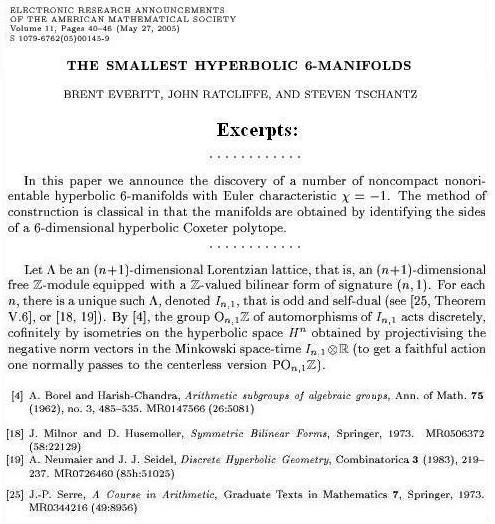
Sunday, August 7, 2005
Sunday August 7, 2005
The Rev. Dr. Theodore Alexander Gill Sr., a Presbyterian theologian, a philosophy teacher, and an influential provost emeritus of John Jay College of Criminal Justice in Manhattan, died at 85 on June 10 in Princeton. In retirement from John Jay, The Rev. Dr. Gill was theologian in residence at Nassau Presbyterian Church in Princeton.
In memory of The Rev. Dr. Gill:
Religious Symbolism at Princeton
(on Nassau Presbyterian Church),
Pro-Semitism
(on number theory at Princeton),
For the Mad Musicians of Princeton,
(on Schroeder and Bernstein),
Movie Date and its preceding entries
(on Princeton’s St. John von Neumann),
Why Me?
(for Princeton theologian Elaine Pagels),
Notes on Literary and Philosophical Puzzles
(Princeton’s John Nash as Ya Ya Fontana), and
Go Tigers!
(for the Princeton Evangelical Fellowship).
Sunday, January 23, 2005
Sunday January 23, 2005
Death and the Spirit,
Part IV
See also
Death and the Spirit, Part II, and
Death and the Spirit, Part III.
Saturday, January 22, 2005
Saturday January 22, 2005
Go Tigers!
Recommended reading for the
Princeton Evangelical Fellowship (PEF):
Walter Kirn, Lost in the Meritocracy,
Atlantic Monthly Jan.-Feb. 2005

"Only by the form, the pattern,
Can words or music reach
The stillness."
— T. S. Eliot
Wednesday, January 19, 2005
Wednesday January 19, 2005
But seriously…
A follow-up to the previous "tiger" entry (which was about an old but good dirty joke).
I just subscribed to The New York Review of Books online for another year, prompted by my desire to read Roger Shattuck on Rimbaud, a tiger of another sort:
"How did this poetic sensibility come to burn so bright?"
The Shattuck piece is from 1967, the year of The Doors' first album. (See Sunday's Death and the Spirit, Part II.)
Tuesday, January 18, 2005
Tuesday January 18, 2005
the Spirit, Part III
In memory of comedian
Gene Baylos, who died
on Jan. 10, 2005:
From the dark jungle
as a tiger bright,
Form from the viewless Spirit
leaps to light.
— Rumi, "Reality and Appearance"
Sunday, January 16, 2005
Sunday January 16, 2005
Death and the
Spirit, Part II
Are you a lucky little lady
in The City of Light
Or just another lost angel…
City of Night
— Jim Morrison, L.A. Woman
Fourmillante cité,
cité pleine de rêves,
Où le spectre en plein jour
raccroche le passant
— Baudelaire,
Les Fleurs du Mal,
and
Notes to The Waste Land
"When you got the mojo, brother —
when you're on the inside —
the world is fantastic."
— Pablo Tabor in Robert Stone's
A Flag for Sunrise,
Knopf, 1981, p. 428
|
Now it was Avril's turn to understand and he was frightened out of his wits.
"The Science of Luck," he said cautiously. "You watch, do you? That takes a lot of self-discipline." "Of course it does, but it's worth it. I watch everything, all the time. I'm one of the lucky ones. I've got the gift. I knew it when I was a kid, but I didn't grasp it." The murmur had intensified. "This last time, when I was alone so long, I got it right. I watch for every opportunity and I never do the soft thing. That's why I succeed." Avril was silent for a long time. "It is the fashion," he said at last. "You've been reading the Frenchmen, I suppose? Or no, no, perhaps you haven't. How absurd of me." "Don't blether." The voice, stripped of all its disguises, was harsh and naive. "You always blethered. You never said anything straight. What do you know about the Science of Luck? Go on, tell me. You're the only one who's understood at all. Have you ever heard of it before?" "Not under that name." "I don't suppose you have. That's my name for it. What's its real name?" "The Pursuit of Death." |
Anagrams
In memory of Danny Sugerman,
late manager of The Doors:
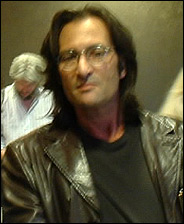
Danny Sugerman
Photo by
Frank Alan Bella, 2002
"Mr Mojo Risin" = "Jim Morrison."
"Audible Era" = "Baudelaire."
"Bad Rumi" = "Rimbaud."
From the dark jungle
as a tiger bright,
Form from the viewless Spirit
leaps to light.
— Rumi, "Reality and Appearance,"
translated by R. A. Nicholson
(See also Death and the Spirit
from Twelfth Night, 2005, the date
of Danny Sugerman's death.)
Friday, April 11, 2003
Friday April 11, 2003
Heaven’s Gate
“Rhetoric is concerned with the state of Babel after the Fall.”
— Kenneth Burke, A Rhetoric of Motives, quoted by Douglas Robinson at the site Linguistics and Language
“Location: present-day Iraq, between the Tigris and Euphrates
Cities: Babylon, founded 2300 BC, 70 miles south of present Baghdad, on the Euphrates….
Babylon = Bab-ilu, “gate of God,” Hebrew: Babel or Bavel.”
|
Modern rendition |
Kenneth |
Perhaps the real heaven’s gate is at
Instant karma update:
At 5:09 PM I read the following in the New York Review of Books, dated May 1, 2003, which arrived today.
From a review of Terror and Liberalism, by Paul Berman:
“As a general analysis of the various enemies of liberalism, and what ties them together, it is superb. All — Nazis, Islamists, Bolsheviks, Fascists, and so on — are linked by Berman to the ‘ur-myth’ of the fall of Babylon.”
Speaking of Ur, Berman likes to quote a non-Biblical Abraham, named Lincoln. The first, Biblical, Abraham was a damned homicidal lunatic, and the later American Abraham also delighted in blood sacrifice. But that’s just my opinion. For a different view, see the Chautauqua Abrahamic Program.
Tuesday, February 25, 2003
Tuesday February 25, 2003
Song of Not-Self
A critic on the abstract expressionists:
"…they painted that reality — that song of self — with a passion, bravura, and decisiveness unequaled in modern art."
Painter Mark Rothko:
"I don't express myself in painting.
I express my not-self."
On this day in 1957, Buddy Holly and his group recorded the hit version of "That'll Be the Day."
On this day in 1970, painter Mark Rothko committed suicide in his New York City studio.
On February 27, 1971, the Rothko Chapel was formally dedicated in Houston, Texas.
On May 26, 1971, Don McLean recorded "American Pie."
Rothko was apparently an alcoholic; whether he spent his last day enacting McLean's lyrics I do not know.
Rothko is said to have written that
"The progression of a painter's work, as it travels in time from point to point, will be toward clarity: toward the elimination of all obstacles between the painter and the idea, and between the idea and the observer. As examples of such obstacles, I give (among others) memory, history or geometry, which are swamps of generalization from which one might pull out parodies of ideas (which are ghosts) but never an idea in itself. To achieve this clarity is, inevitably, to be understood."
— Mark Rothko, The Tiger's Eye, 1, no. 9 (October 1949), p. 114
Whether Holly's concept "the day that I die" is a mere parody of an idea or "an idea in itself," the reader may judge. The reader may also judge the wisdom of building a chapel to illustrate the clarity of thought processes such as Rothko's in 1949. I personally feel that someone who can call geometry a "swamp" may not be the best guide to religious meditation.
For another view, see this essay by Erik Anderson Reece.










